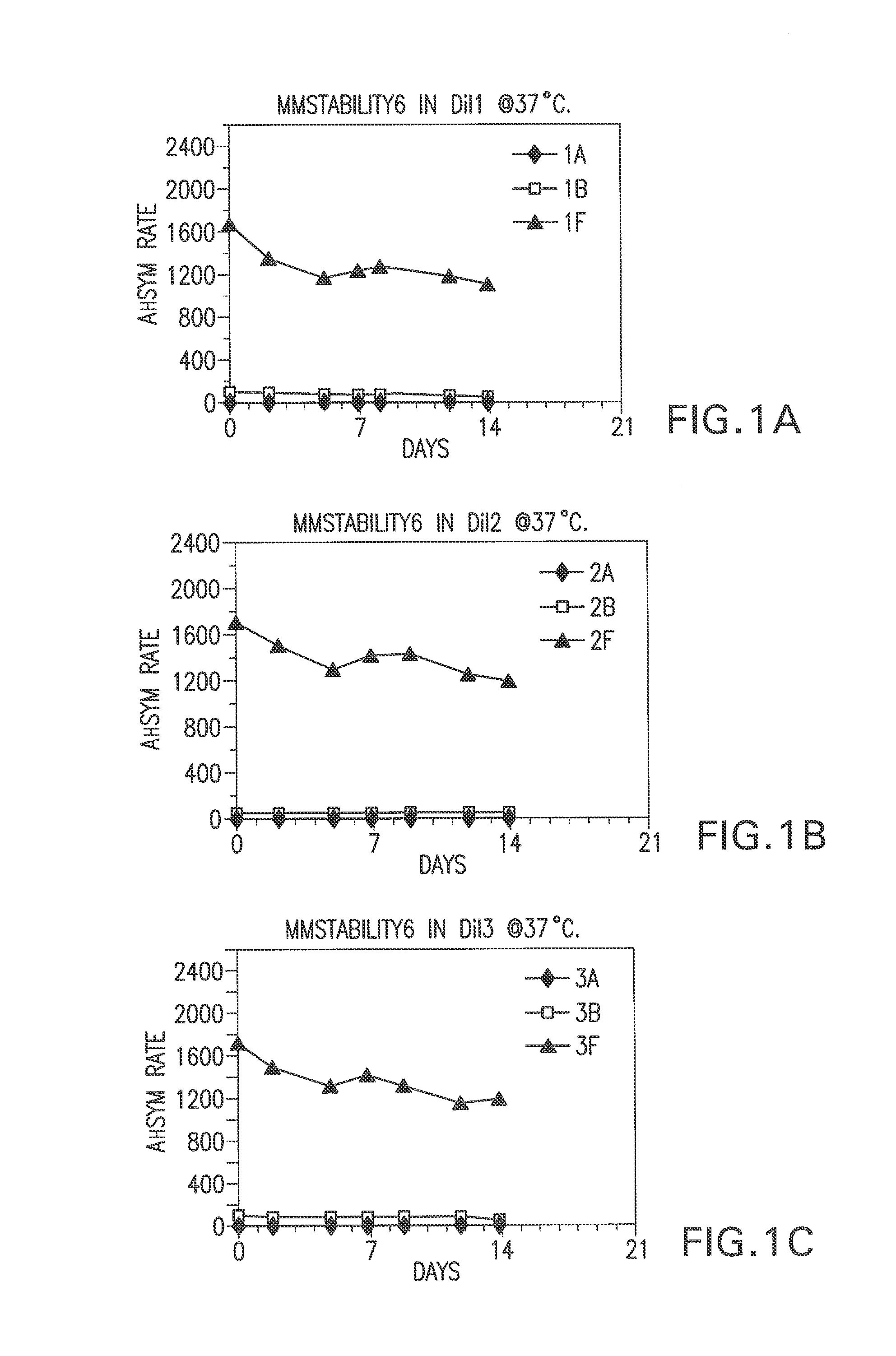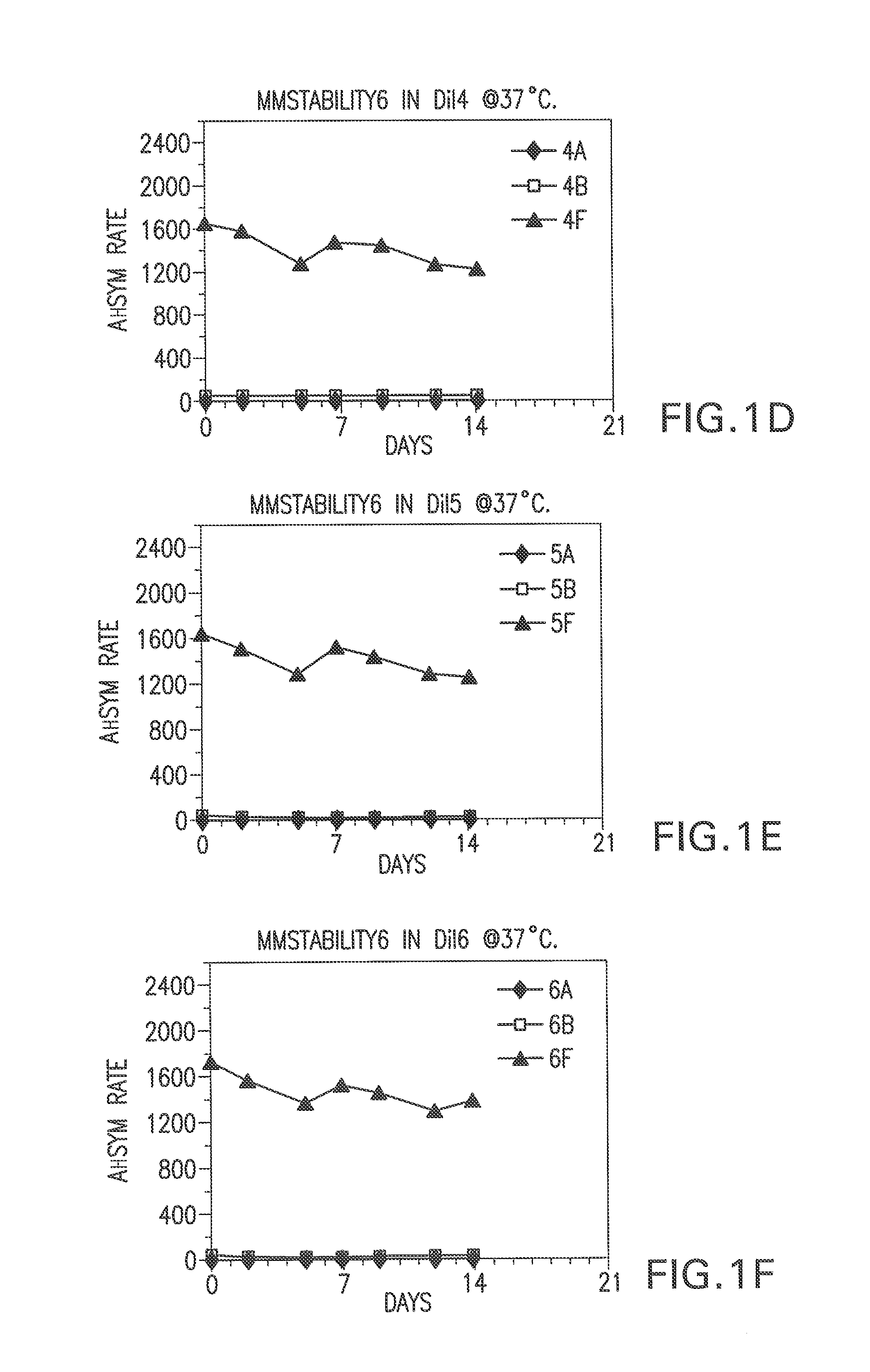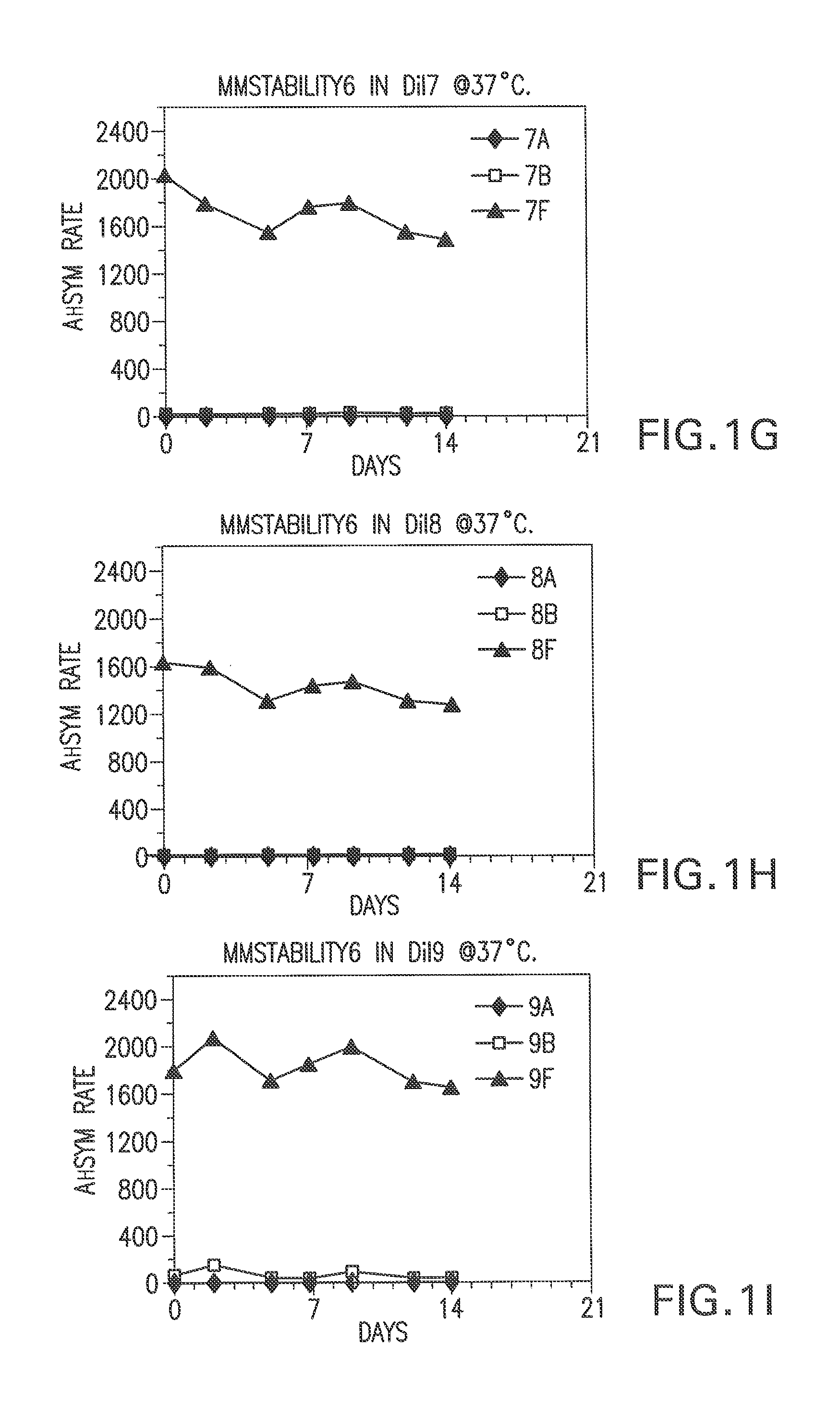A method of stabilizing human natriuretic peptides
a natriuretic peptide and human natriuretic peptide technology, applied in chemical methods analysis, instruments, enzymology, etc., can solve the problems of unstable plasma and serum natriuretic peptides, difficult cleavage, and difficult cleavag
- Summary
- Abstract
- Description
- Claims
- Application Information
AI Technical Summary
Benefits of technology
Problems solved by technology
Method used
Image
Examples
example 1
BNP Immunoassay
[0067]Bulk diluents (“Dil”) having the following formulations were prepared:
Experimental Control Diluent=4% BSA, 1% PEG, 0.1% Tween, 1% Dextran, 0.1% Proclin® 300, MEIA2 diluent.
Dil1=2% BSA, 0.1% Proclin® 300, MEIA2 diluent
Dil2=Same as Dil1.
Dil3=2% BSA, 0.1% ProClin® 300, MEIA2 diluent and 0.1% Tween.
Dil4=Same as Dil3.
Dil5=2% BSA, 0.1% ProClin® 300, MEIA2 diluent and 10 mM DTPA
Dil6—Same as Dil5.
Dil7=2% BSA, 0.1% ProClin® 300, MEIA2 diluent, 0.1% Tween, 10 mM DTPA.
Dil8=Same as Dil7.
Dil9=Same as Dil1.
Dil10=Same as Dil2.
Dil11=Same as Dil3.
Dil12=Same as Dil4.
Dil13=Same as Dil5.
Dil14=Same as Dil6.
Dil15=Same as Dil7.
Dil16=Same as Dil8.
[0068]After each of the above diluents was prepared, the pH was determined. The pH of diluents 7-16 was adjusted. Specifically, for diluents that did not contain DTPA, HCl was added (drop wise) to adjust the pH (to about 5.6). For the diluents that contained DTPA, NaOH was used to adjust the pH (to about 5.6 or 7.4). The pH was not adjusted fo...
example 2
BNP Immunoassay
[0085]Bulk diluents (“Dil”) of the following formulations were prepared.
Experimental Control Diluent=4% BSA, 1% PEG, 0.1% Tween, 1% Dextran, 0.1% Proclin® 300, MEIA2 diluent.
Dil1=2% BSA, 0.1% Proclin® 300, MEIA2 diluent
Dil2=Same as Dil1.
Dil3=2% BSA, 0.1% Proclin® 300, MEIA2 diluent and 0.1% Tween.
Dil4=Same as Dil3.
Dil5=2% BSA, 0.1% Proclin® 300, MEIA2 diluent and 10 mM DTPA
Dil6—Same as Dil5.
Dil7=2% BSA, 0.1% Proclin® 300, MEIA2 diluent, 0.1% Tween, 10 mM DTPA.
Dil8=Same as Dil7.
Dil9=Same as Dil1.
Dil10=Same as Dil2.
Dil11=Same as Dil3.
Dil12=Same as Dil4.
Dil13=Same as Dil5.
Dil14=Same as Dil6.
Dil15=Same as Dil7.
Dil16=Same as Dil8.
[0086]After each of the above diluents was prepared, the pH was determined. The pH of diluents 7-16 was adjusted. Specifically, for diluents that contained DTPA, NaOH was added (drop wise) to adjust the pH (to about 5.6). For the diluents that contained DTPA, NaOH was used to adjust the pH (to about 5.6 or 7.4). The pH was not adjusted for diluent...
example 3
BNP Immunoassay
Bulk diluents (“Dil”) of the following formulations were prepared.
Dil1=2% BSA, 0.1% Proclin® 300, 10 mM DTPA
Dil2=2% BSA, 0.1% Proclin® 300, 10 mM DTPA, 100 mM NaCl, 0.1% sodium azide in water
Dil3=2% BSA, 0.1% Proclin® 300, 10 mM DTPA, 100 mM NaCl, 0.1% sodium azide in water
Dil4=2% BSA, 0.1% Proclin® 300, 10 mM DTPA, 100 mM NaCl, 0.1% sodium azide in water
Dil5=2% BSA, 0.1% Proclin® 300, 10 mM DTPA, 100 mM NaCl, 0.1% sodium azide in water
Dil6=2% BSA, 0.1% Proclin® 300, 10 mM DTPA, 100 mM NaCl, 0.1% sodium azide in water
Dil7=2% BSA, 0.1% Proclin® 300, 10 mM DTPA, 100 mM NaCl, 0.1% sodium azide in water
Dil8=2% BSA, 0.1% Proclin® 300, 10 mM DTPA, 100 mM NaCl, 0.1% sodium azide in water
Dil9=2% BSA, 0.1% Proclin® 300, 10 mM DTPA, 100 mM NaCl, 0.1% sodium azide in water
Dil10=2% BSA, 0.1% Proclin® 300, 10 mM DTPA, 100 mM NaCl, 0.1% sodium azide in water
[0092]In addition, to the components listed above, diluent 1 also contained MEIA2 as a base diluent. Diluents 3-6 also contain...
PUM
| Property | Measurement | Unit |
|---|---|---|
| temperatures | aaaaa | aaaaa |
| temperature | aaaaa | aaaaa |
| temperature | aaaaa | aaaaa |
Abstract
Description
Claims
Application Information
 Login to View More
Login to View More - R&D
- Intellectual Property
- Life Sciences
- Materials
- Tech Scout
- Unparalleled Data Quality
- Higher Quality Content
- 60% Fewer Hallucinations
Browse by: Latest US Patents, China's latest patents, Technical Efficacy Thesaurus, Application Domain, Technology Topic, Popular Technical Reports.
© 2025 PatSnap. All rights reserved.Legal|Privacy policy|Modern Slavery Act Transparency Statement|Sitemap|About US| Contact US: help@patsnap.com



